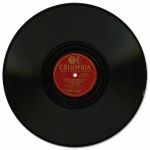Liner Notes
What Was An Album?
by Jeff Clutterbuck
 It isn't that farfetched to think that by the time I have kids that can appreciate music, one of the first questions they'll ask me will be, "What was an album?"
It isn't that farfetched to think that by the time I have kids that can appreciate music, one of the first questions they'll ask me will be, "What was an album?"
In the days of Elvis, Buddy Holly and Jerry Lee Lewis, the music industry was unquestionably a singles-driven business. If you couldn't keep delivering top-notch songs one at a time, then your time in the sun was up. However, things started to change in the late '60s, thanks to visionaries such as the Beatles and Brian Wilson. These artists completely changed the way music was viewed; instead of buying a record and hearing twelve singles, now they viewed as 40-minute works of art united by one theme, one message, or one sound. If albums such as Dark Side Of The Moon, Nebraska, or Captain Fantastic And The Brown Dirt Cowboy are favorites of yours, thank the musical luminaries of the 1960s.
Through the 1970s, the album continued to be the definitive statement by an artist. Sure singles still were released and sold well, but the album defined a musician's career. Led Zeppelin charted very few hits, but still became one of the top-selling bands of all time. In the '90s Nirvana scored only one Top Ten hit, the legendary "Smells Like Teen Spirit." However many consider them to be the most influential band of the era. Both of these groups staked their claims not on neatly packaged singles, but on genuine works of art (though that's a stretch for In Through The Out Door…).
The first chink in the album's proverbial armor appeared with the invention of the CD. Whereas with vinyl one was "forced" to listen to entire sides of albums, CDs allowed the listener to skip to any song at any time. Patience was not required to listen to an album anymore. The situation further changed with the advent of the Internet, and the creation of peer-to-peer sharing. Suddenly, a fan did not have to spend 15 dollars to hear one or two good songs followed by ten more of filler. The CD collections of millions were filled with self made "mix" collections, or one's own personal take on an album. In this way, the digital age has propagated one-hit wonders.
The biggest draw to programs like Napster was simple; it was free. Most people who would try to justify their actions via some high moral standards were lying through their teeth. Why pay for a CD when it's there on Grokster for free? So that was the major element; however, countless other reasons exist. "I wanted to hear what the music was like," "I don't believe there's anything wrong in the sharing of information," or "I didn't want to pay 13 bucks to get a few good songs."
So how have the mindsets of the people affected the music itself? I would argue there has been a conscious and purposeful return to the singles landscape last seen forty years ago. Quite simply, it happens all too often that a single is the best song from an album, as well as the only decent track. Radio is then saturated with these songs, and they are all the public is allowed to hear. Then, one just has to log on to iTunes and download the song for a buck.
This would have been a problem in the days of classic rock; imagine someone downloading just "Cuckoo Cocoon" from Genesis' The Lamb Lies Down On Broadway. Think of all the other brilliant music that person would be missing out on from the rest of the album. Today the demand has completely changed. How many AOR records top the charts these days? Mainstream musicians are not going to take risks, in part because the labels won't let them, and in part because singles are what the audience wants.
The line of what actually constitutes of an album is becoming all the more blurred as well, especially with the additions of new formats such as DualDisc. The latter contains the "normal" album on one side, and on the other, higher quality mixes or documentaries can be found. The debate then becomes a game of, "What is the album according to the artist." Did Bruce Springsteen intend a 5.1 mix of Devils & Dust to be heard as the ultimate take for the listener? Was Ben Folds' Songs For Silverman recorded with the higher quality mixes in mind, thus affecting the recording itself? In two years, will the substance of the accompanying videos and documentaries be included in reviews as part of the overall "album experience"? Instead of a strictly audio episode, the consumer will be presented a multimedia package. As the record labels attempt to lure listeners back to the fold by offering the aforementioned incentives to buy a CD, will the focus remain on the music or the overall product? This is a very important question both the public and the music industry are going to have to grapple with soon.
Let me make this perfectly clear, this essay is not a condemnation of all music out there today. There are amazing, very artistic albums to be found, made by artists who do it for the music. However, the mindset of the majority of the music industry, along with the advent of new technology, is killing off album-driven music. I just hope the decline reverses its course before my kids eventually do end up asking me, "Dad, what was an album?"